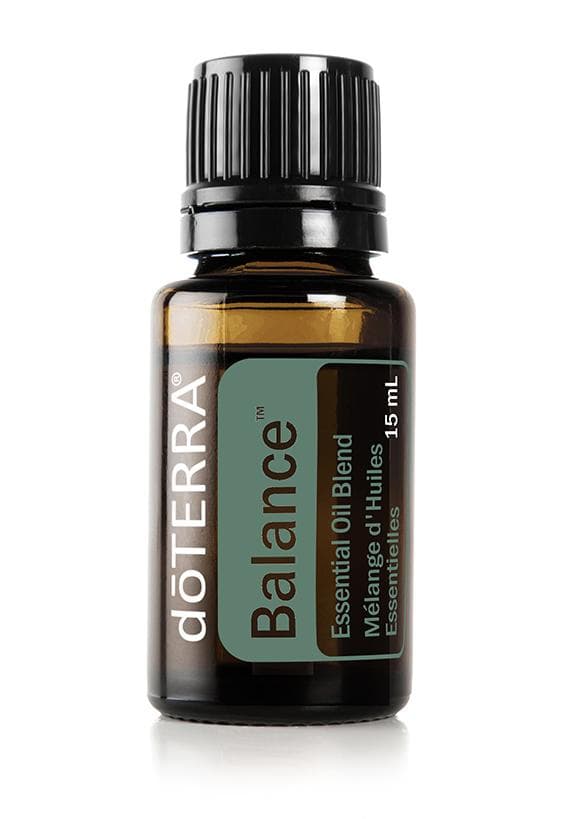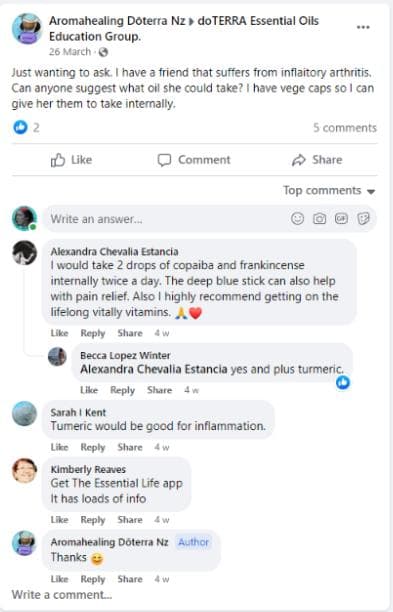Oily Matters Part 2: dōTERRA
Bronwyn Rideout (April 25, 2022)

Country of Origin: Pleasant Grove, Utah, United States
Year Founded: April 25th, 2008
Founded by: David Stirling, Emily Wright, David Hill, Corey B. Lindley, Gregory P. Cook, Robert J. Young, and Mark A. Wolfert. Stirling, Wright, and Hill were former executives of Young Living.
Year MLM established in New Zealand: Incorporated on May 4th, 2017. Warehouse opened on December 5th, 2017, and an essential oil distillery, aoTERRA, opened on October 11, 2018.
Generally sells: Essential Oils. Has expanded into haircare, household products, supplements (including a line aimed at children), weight loss products, diffusers, and accessories.
“Cult” products:

Balance, an essential oil blend which “…promotes harmony, tranquillity, and a sense of relaxation through its grounding, peaceful fragrance”. It consists of 6 different oils with a base of coconut oil. OnGuard is another popular offering, which is often compared to Young Living's Thieves Oil. New Zealand advertising leans more on it creating a cleansing and uplifting environment, and its use as a non-toxic cleaner - while leaving its claims of protecting “...against environmental and seasonal threats” vague. The US website is more specific about its utility to “support” the body's immune system, respiratory function, and natural antioxidant defenses when used internally.
Is there a buy-in?: You can start by buying starter packs for as low as $184 NZD wholesale. Bedtime Bliss is the cheapest, and contains four 15ml vials, a 10ml vial and some fractionated coconut oil with your membership.
Name for workforce: Wellness Advocates, and then the organisational ladder moves up through manager, director, executive, elite, premier, silver, gold, platinum, diamond, blue diamond and finally presidential diamond.
Compensation Plan?: Here
Income Disclosure Statement?: dōTERRA is not very good at providing a clear document either in NZ or abroad. In this 2021 ”report”, based on US figures, entry level wellness advocates represented 41% of the workforce, and 55% of these earned an average annual commission of $341 USD. Wellness advocates who have decided to get into the recruiting aspect of the MLM account for 27% of all members, and encompass the ranks from Manager to Premier. Their annual take-home can average between $665 USD and $1117 USD.
The highest 6 ranks account for 1% of the US workforce. From this 1%, 60% of them will make an annual income of $28,658 USD.
The 2020 US Opportunity and Earnings Disclosure Summary is slightly more specific on the numbers, which makes it all the more damning. It claimed that there were 509,000 US wellness advocates, and about 257,000 of these earned money from their sales and from those that they “sponsored”. Of those that made money, 8,052 distributors in their first year of selling earned more than $105, while the top 1% of that group (161 distributors) earned more than $870. Of distributors who stuck around for longer than a year (accounting for 240,903 sellers), 120,452 earned more than $345 USD per year on average, and 2,409 of them earned more than $9,495.
Has a reputation for: Unethical and unproven medical advice by its distributors, which made them popular fodder for the anti-MLM community during the height of the pandemic. Both the company and wellness advocates are big on including essential oils in recipes.
Should you be worried?: Yes, especially when popularity in the dōTERRA sphere can be leveraged into social media influencer gold during a pandemic.
If you have been doom watching/reading/scrolling at all during the pandemic, the name dōTERRA should ring a bell. It is the MLM to which the founders of Voices for Freedom were attached. A search for Claire Deeks name with dōTERRA shows still active websites about Claire's ethos and her status as a Diamond, one of the elite ranks in the company. Libby Jonson and Alia Bland had bigger profiles in the fibre arts scene, but screenshots provided by Newshub imply that they, too, were into oily matters and tried to draw in the dōTERRA fanbase. Deeks, despite her cooking credentials, did publish some recipes in which essential oils were on the ingredient list.
The ingesting of essential oils is controversial amongst aromatherapists, but outright verboten by health authorities. The main issues with essential oils? Their effectiveness or safety has not been scientifically proven, and there is a big problem with regulation on both sides of the Tasman (especially if products are being shipped from the US or UK). Just because something is labelled pure or natural, doesn't mean you should put it in your mouth.
For children, even the aroma from diffused oils can be dangerous. Tim Rainey used this argument in the press when he threatened Milford Primary School with court action upon discovering dōTERRA oils were being used in their classrooms. The school claimed that there was a noticeable difference in behaviour and absence due to illness when dōTERRA oil blend OnGuard was used in the classroom. Rainey countered that the ingredients in that blend were known irritants for people with allergies and asthma, and Alison Campbell's BioBlog from the University of Waikato has a decent breakdown of the claims made in the initial newsletter.
While principal Sue Cattell was initially suspected of being a wellness advocate, a request under the Official Information Act shows that the school claims that it was a parent who convinced the Board of Trustees to spend $2800 on at least one oil and several diffusers. The rep, who remained nameless, claimed to have hung out by the back entrance of the school, offering a whiff of Wild Orange oil to parents and children suffering from separation anxiety. Said rep also allegedly made health claims that a blend of eucalyptus and peppermint oils allowed their son to kick the inhaler they used for their asthma, and went beyond the pale by making reference to the Christchurch terror attacks. The Ministry of Education kept its distance on this matter; it stated that the use of diffusers was a board of trustees issue, while also providing a link in their OIA response to the website Essential Oils Supplies which, obviously, supported the use of oils in the classroom (this can be read in the ZIP file here). Nevertheless, that this was trialled without parents' consent is appalling.
If these and other shenanigans sound like another essential oil-based MLM that was profiled here a week ago, you're absolutely correct.
dōTERRA was established in April 2008 by several former executives of Young Living, taking with them several of Young Living's top sellers and insider knowledge about their most profitable products. This allowed them to quickly catch up to Young Living, to become its main competitor for the title of top-distributor of essential oils in the world. However, this pedigree landed dōTERRA in a long series of suits and counter suits with Young Living.
dōTERRA claims that its point of difference from Young Living lies in its products being Certified Pure Therapeutic Grade (CPTG), which ensures that each bottle is free from contaminants and synthetic filters via third-party testing. However, there are no set of specifications that define an essential oil as “certified therapeutic”. Furthermore dōTERRA owns the exclusive use of the mark “Certified Pure Therapeutic Grade”, demonstrating that this is all just a commercial and marketing stunt.
Like Young Living, dōTERRA ran afoul of the US Food and Drug Administration (FDA) for a multitude of claims its distributors made regarding the oils' efficacy with treating Ebola, cancer, and autism. Mark Honeychurch had similar claims made to him by New Zealand distributors in 2017 and 2018, while I've also witnessed distributors sharing information about using oils to treat arthritis and bleeding:


Source (While I want to acknowledge Taylor Poole for doing the mahi here, if she is on a dōTERRA education page, she's likely a distributor herself)
And finally, oils to cure a UTI (I want to hope that no one is applying oils to their urethra!):

The irony is that dōTERRA claims to take these matters seriously, and says they have a large compliance department which monitors social media and engages distributors in extensive training on NOT making medical claims. However, in the context of Facebook groups like the doTERRA Essential Oils Education Group, the line between retail customer and wellness advocate are blurred. As these claims are done in an educational context and not in an advertisement, there is little that can be done to censure the MLM itself.
And, maybe, there is little incentive for the NZ government to do so either. In 2018, Dame Patsy Reddy GG, was photographed visiting a dōTERRA owned oil distillery in Arrowtown called aoTerra. Douglas Fir oil is normally harvested in the US for other markets but the company claims that because douglas fir is an invasive species in NZ, then the distillery here is providing a net good by combatting their environmental impact. The question remains if the profitability of the distillery motivates dōTERRA to actually propagate the tree rather than control it, while the creation of employment makes it easier for government departments to look away.
In May 2022, dōTERRA Australia/NZ will have their first in-person convention in three years in Melbourne. An online component is available as well, at a lower ticket price ($50 versus $125 for the in-person) just so you only have a little bit of FOMO. I'll keep the skeptics posted if anything outrageous leaks out.
If you are interested in learning more about dōTERRA and its shady practices, YouTube and the anti-MLM community have once again not failed to deliver: